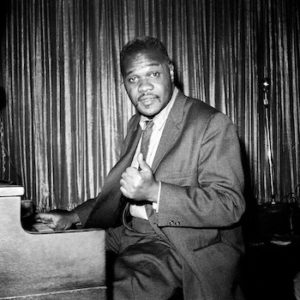
Hasaan Ibn Ali
*Hasaan Ibn Ali was born on this date in 1931. He was a Black jazz pianist and composer.
William Henry Langford, Jr. was born in Philadelphia, and his mother was a domestic worker. In 1946 (aged 15), he toured with trumpeter Joe Morris's rhythm and blues band. In 1950, he played locally with Clifford Brown, Miles Davis, J. J. Johnson, and Max Roach.
Based in Philadelphia, Ibn Ali did freelance work and built a reputation locally as "an original composer and theorist," in musicologist Lewis Porter's words. The pianist played with Horace Arnold in New York City in 1959 and again in 1961–62 in a trio with Henry Grimes. According to Roach, on visits to New York, Ibn Ali went from club to club to play and sometimes went to the drummer's home in the middle of the night to continue playing, alone, on the piano there. Roach routinely recorded Ibn Ali's playing when the pianist visited.
The Library of Congress has a 1964 recording of an Ibn Ali solo improvisation recorded at Roach's home. John Murph in JazzTimes described it in 2014 as "Thoroughly modern with a whimsical rhythmic undertow and wayward melodic passages; it sounds like a new Jason Moran composition." Ibn Ali remained an obscure figure until his only released recording, The Max Roach Trio Featuring the Legendary Hasaan, was recorded on December 4 and 7, 1964, and released six months later. The trio contained Roach and bassist Art D.
The album consisted of seven tracks, all written by Ibn Ali. The recording opportunity initiated by Roach used his influence with the owner of Atlantic Records to secure the session for Ibn Ali. Alan Sukoenig, in his liner notes to the album, wrote, "For a while, it appeared that it was Hasaan Ibn Ali's destiny to be known to those who had heard of him at all as the extraordinary jazz pianist from Philadelphia, who had never made a record." After the album, Ibn Ali returned to obscurity. According to music journalist Tom Moon, Ibn Ali was "Described by (usually tolerant) jazz musicians as eccentric and unstable."
Saxophonist Odean Pope, whom Ibn Ali mentored, stated that the pianist "was so advanced that musicians shied away from him. He was very dedicated and frank, but also very outspoken. If he were in a club, and the pianist wasn't making it, Hasaan would push him right off the bench and start playing himself." Pope also described the times they practiced together for several years in the house that Ibn Ali lived in with his parents. Pope arrived at the house in the morning.
They played from 9:30 until 12:00, had a break for lunch, played chess, and continued practicing until four or five o'clock. Ibn Ali then got dressed, having been in his bathrobe, and they went out to play in the homes of people nearby for "a couple of dollars and some hot tea." Pope credits Ibn Ali with influencing saxophonist John Coltrane's sheets of sound approach. Ibn Ali examined the possibilities of playing fourths and using "chord progressions that moved by seconds or thirds instead of fifths, in playing a variety of scales and arpeggios against each chord" – features later used extensively in Coltrane's playing.
A home recording of Ibn Ali playing with Coltrane and others in 1952 may exist. Pope also commented that "every important musician who came out of this area [Philadelphia] in the fifties and sixties, including McCoy Tyner, learned from him." Elmo Hope strongly influenced Ibn Ali, and his playing was rapid and intense, retaining a sense of rhythm even when his style became increasingly unconventional. Several recordings of his playing may exist, but only one, The Max Roach Trio Featuring the Legendary Hasaan, has been released. Ibn Ali built a reputation in Philadelphia, influencing many musicians but remaining little known elsewhere. "Reckless with his health, Hasaan died young," commented writer Geoffrey Haydon in 2002.
The New Grove Dictionary of Jazz states that Ibn Ali died in Philadelphia in 1980 (aged 48 or 49). Ibn Ali's parents died in a fire that destroyed their home at 2406 North Gratz Street on October 24 that year. He went to a recreation center for homeless people after the fire.